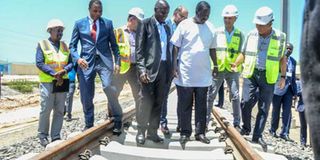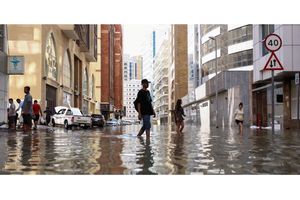Odinga: Train locals to undertake large projects

The African Union’s High Representative for Infrastructure Development in Africa, Mr Raila Odinga (in short sleeves), inspects in Dar es Salaam yesterday a section of the standard gauge railway being constructed between the city and Morogoro. Others are Tanzania Railways Corporation (TRC) board chairman John Kondoro (next to Mr Odinga) and TRC managing director Masanja Kadogosa. PHOTO | TRC
What you need to know:
- African Union’s High Representative for Infrastructure Development in Africa, Mr Raila Odinga, toured Tanzania’s Standard Gauge Railway (SGR) project site yesterday and called upon the country to train more local experts who would undertake similar projects in future.
- Mr Odinga, a leading opposition leader and former Kenya’s Prime Minister, chaired a meeting on infrastructure in Dar es Salaam earlier on the day
Dar es Salaam. The African Union’s High Representative for Infrastructure Development in Africa, Mr Raila Odinga, toured Tanzania’s standard gauge railway (SGR) project site yesterday and called upon the country to train more local experts who would undertake similar projects in future.
Mr Odinga, who is also an opposition leader in Kenya and a former Prime Minister, chaired a meeting on infrastructure in Dar es Salaam earlier in the day.
Last year, Mr Odinga was named special AU envoy on Infrastructure Development in Africa. His mandate includes mobilising political support from member states and regional economic blocs and facilitating greater ownership by all concerned stakeholders on the continent.
The two-day meeting, which ended yesterday, was organised by the African Union Development Agency-New Partnership for African Development (Auda-Nepad) and the Central Corridor Transit Transport Facilitation Agency (CCTTFA).
After the meeting, he toured the SGR project site at Pugu where he said projects of that nature were essential for development of the country and in strengthening business among East African Community (EAC) member states. He noted, however, that Tanzania needed to train more locals by taking advantage of the SGR project.
“As a Kenyan national, I’m very happy with the construction progress of SGR in Tanzania. We are currently executing a project like this one in Kenya. We started construction before you but your pace is impressive. This shows how serious the government is about the project,” he said.
Available data shows that construction of the SGR project from Dar es Salaam to Morogoro is 45.8 per cent done while that from Makutupora to Tabora is at seven per cent.
Tanzania Railways Corporation CEO Masanja Kadogosa said Mr Odinga has inspired them.
Speaking earlier after chairing the meeting in Dar es Salaam (in his capacity as chairman of a technical working group meeting of Regional Economic Corridor Authorities with a task of discussing the Trans African Highway Project), Mr Odinga said Africa needed to mobilise local funds to finance major infrastructure development projects which link the continent.
The move, he said, will help the countries avoid huge foreign debts.
“Before kneeling down and begging for foreign funding, we need to use our own resources first. I am aware that there are billions of dollars in our pension and sovereignty funds so let us just use them,” he said.
He said depending on foreign lending may see some countries losing their sovereignty especially when they fail to repay the funds.
“We must start somewhere and only seek foreign help when necessary. We can’t just beg with nothing in our hands,” he said, noting that making use of Public Private Partnership (PPP) may also help.
He said AU’s priority was to link all African countries and business corridors to ease movement of people and goods in order to promote trade among them and reduce the cost of doing business.
“During the two-day meeting, we managed to come up with a document known as ‘Dar es Salaam Action Plan’ which aims at modernising the Trans African Highway Network (TAHN) with a view to linking all the regional business blocs,” he said.
The Trans-African Highway Project is the network of sophisticated road projects in Africa aimed at connecting all the major cities in the continent involving 10 routes in 16 counties, covering over
60,000 kilometres.
“The action plan has identified and designed a roadmap for the implementation of the project. We currently need funds for conducting feasibility studies before construction starts,” he explained.
If the project is well implemented, it could save up to one $1 billion in logistics and transport costs per year, according to the executive secretary for the CCTTFA Mr Dieudonne Dukundane.
The government of Tanzania said it was willing to participate in the implementation of the Trans African Highway project, according to a representative from the Ministry of Work, Transport and Communication Mr Saidi Mndeme.
“We (Tanzania) are very interested in the project since it aims at connecting 16 landlocked countries of which six of them are depending on our Dar es Salaam port,” he noted.
He added that the government is happy the project is going to address infrastructural challenges which Tanzania faces in delivering the goods to the countries.
Related Story:




